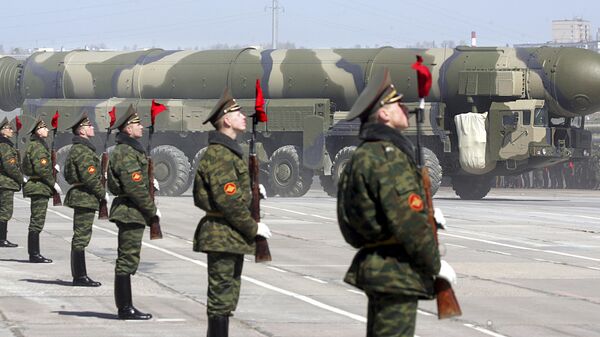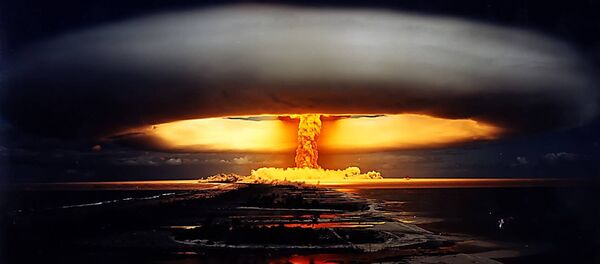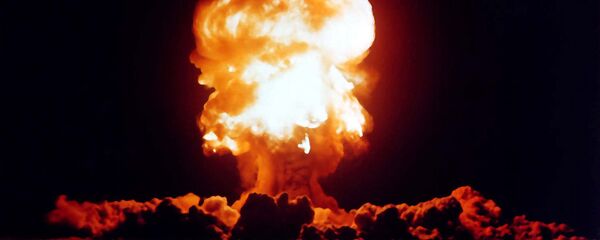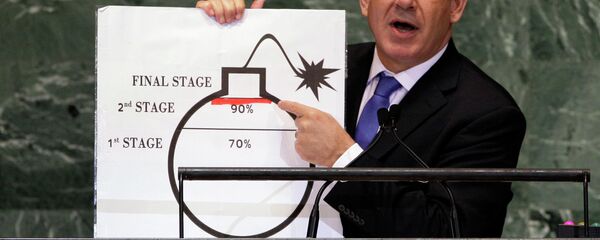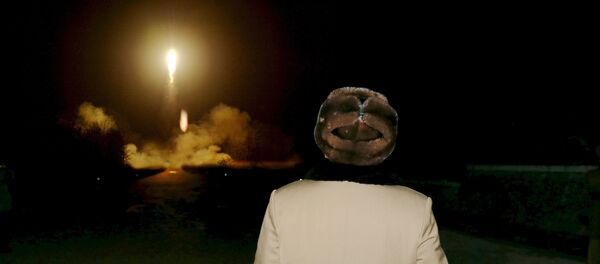In the press release for the bill, Senator Markey explained that "by maintaining the option of using nuclear weapons first in a conflict, US policy increases the risk of unintended nuclear escalation." According to the senator, "the President should not use nuclear weapons except in response to a nuclear attack." The proposed "legislation enshrines this simple principle into law."
With US journalists and political analysts suggesting that the proposed legislation has to do with the prospect of Donald Trump becoming president and given the nuclear codes, their Russian counterparts have offered a different take, which they suggest is worth considering.
Commenting on the bill, Svobodnaya Pressa contributor Andrei Polunin noted that "at first glance, the Democratic initiative is a bad fit with the Pentagon's position. A day earlier, Secretary of Defense Ash Carter accused Russia and North Korea of 'sabre rattling', and said that these were the only two countries which pose a nuclear threat to the United States."
Speaking at the Minot Air Force Base in North Dakota, where he inspected the base's 150 Minuteman III ICBMs, Carter explained that the US and its European allies were now "refreshing" US strategy, integrating conventional and nuclear deterrence. This, the Secretary of Defense said, is meant to "deter Russia from thinking it can benefit from nuclear use in a conflict with NATO." Of course, this "refresher" includes an increase in spending to modernize the US nuclear arsenal and the means of its delivery.
According to the journalist, the question that's worth asking is: What if any connection is there between Carter's words and the bill recently put forth by Democrats in Congress?
The answer, according to Sergei Ermakov, a senior expert at the Russian Institute for Strategic Studies, a think tank established by the Russian president, is that the actions by Congressional Democrats and the Pentagon are pieces to one puzzle.
"In the early 1990s," the expert recalled, "US military analysts actively developed the concept of preventative defense, and these designs have never gone away. It is on the basis of these concepts that the US continues to build its long-term military strategy. The US always proceeded from the assumption that they have an advantage over China and Russia in conventional weapons, and overwhelming superiority in prospective weaponry. Only Moscow's superiority in nuclear forces forced Washington to reckon with Russia as a serious potential opponent."
In recent years the US appraisal of Russian capabilities has since shifted. "Washington has learned that Russia has a strong foundation in Soviet military research, which has allowed the Russian Armed Forces not only to stay afloat, but to ensure their future development. In this situation, the US finds it beneficial to accuse Russia of destabilizing the international situation, in order to maintain and upgrade America's own nuclear arsenal."
This is concerning to Moscow, the analyst explained, since the weapon's glide capability will allow it to target Russian territory without its carrier entering the zone of Russian air and missile defense. Moreover, "this type of weapon is dangerous because there is no way of knowing whether the rocket carrying it carries a nuclear or conventional warhead, thus increasing the risk of unintended escalation."
At the same time, Pentagon analysts remain confident about a qualitative and quantitative superiority in Europe over Russia in conventional armaments. "This assessment is not changing, in spite of the recent noise in Western mainstream media about the US's alleged weakened military might," Ermakov emphasized. Key US experts believe that Russia's latest weapons would make little difference – they are too few in number."
Accordingly, the analyst emphasized, a unilateral US rejection of the doctrine of first strike could be aimed only at tying Russia's hands. "Washington is talking only about giving up preemptive strike using nuclear weapons. But they retain the possibility of a pre-emptive attack by all other types of weapons, and will stand firmly on that principle."
"The result is that in accordance with the doctrine of containing Russia, the US is increasing its nuclear capabilities. Meanwhile, in formally abandoning the doctrine of preemptive nuclear strike, they get an opportunity to 'play in the field', where it is more difficult for Russia's armed forces to achieve superiority over the US. Finally, an initiative rejecting preemptive nuclear strike gives the US a trump card in the information war –allowing them to talk about the 'monstrous aggression of the Russian regime', and blaming Moscow for unleashing an arms race."
"With this numerical superiority, the West expects to win in a war with Russia. But it cannot do so if nuclear weapons become part of the equation. These weapons would destroy Western Europe and the US much faster than Western countries are able to mobilize."
Accordingly, Alexandrov suggested that US lawmakers' proposal is based on the understanding that a nuclear war is unwinnable, and to try to trick Russia into abandoning its established doctrine.
"In essence, the US is repeating the technique of Leonid Brezhnev's Soviet Union, which unilaterally renounced the first use of nuclear weapons. This was done because at the time, the USSR had a significant superiority in conventional forces over NATO. As a result, the use of nuclear weapons was judged to be disadvantageous, since all of Western Europe could be captured without their use. In that situation, it's worth noting, NATO banked on the use of tactical nuclear weapons, which became a deterrent against possible Soviet attack."
"Thus, the Democrats' initiative is aimed at achieving strategic superiority over Russia, and possibly China," the analyst suggested. "Of course, Moscow should not give in to this kind of demagogy. Russia must continue to retain the right to use tactical nuclear weapons first," he emphasized.
Ultimately, Alexandrov noted, Russia has already taken the necessary measures to move to a new generation of nuclear weaponry, from the Iskander tactical missile complex and the Kh-101 strategic cruise missile, which has a range of 5,000 km, to new ballistic missiles capable of overcoming US missile defenses. "All of this has forced the US to maneuver in this way, and to try to outplay Russia in the nuclear field," the analyst concluded.
